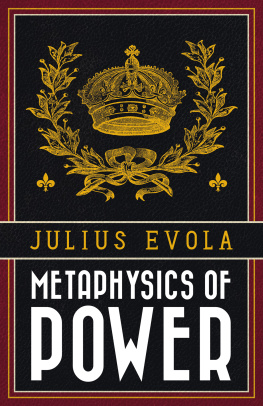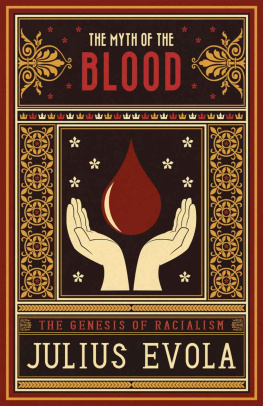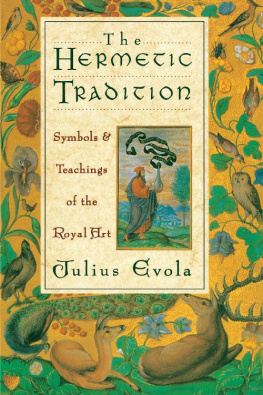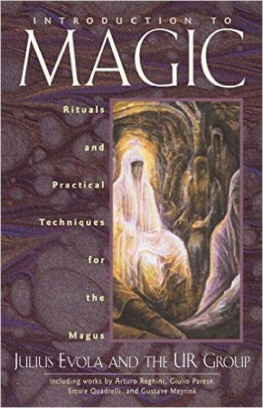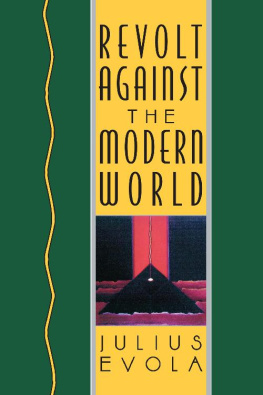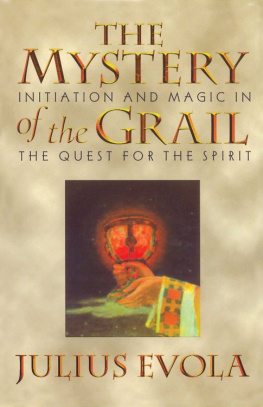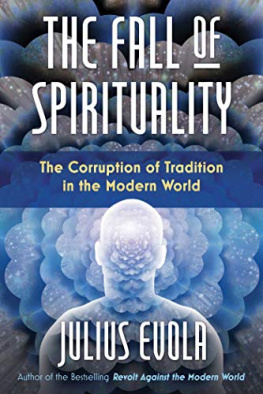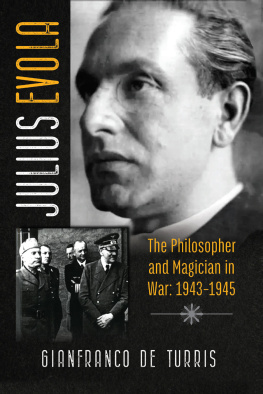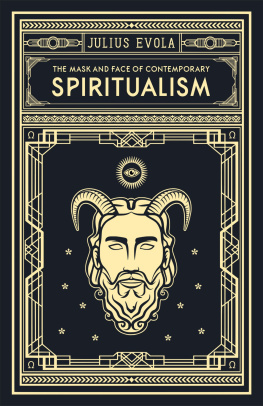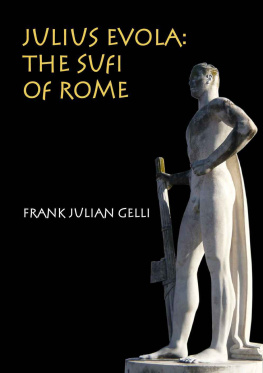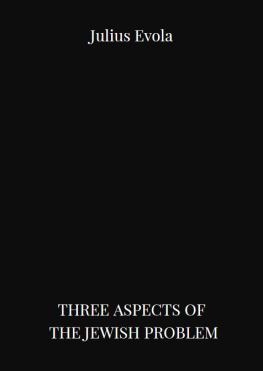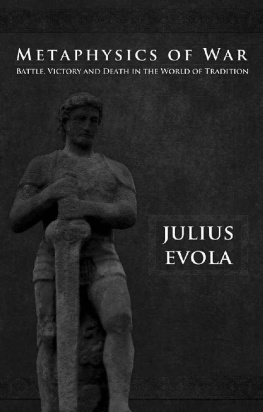Arktos
London 2021
Copyright 2021 by Arktos Media Ltd.
All rights reserved. No part of this book may be reproduced or utilised in any form or by any means (whether electronic or mechanical), including photocopying, recording or by any information storage and retrieval system, without permission in writing from the publisher.
Arktos.com | Telegram | Facebook | Twitter | Instagram | Gab.ai | Minds.com | YouTube | Parler
ISBN
978-1-914208-09-6 (Softcover)
978-1-914208-10-2 (Hardback)
978-1-914208-11-9 (Ebook)
Translation
John Bruce Leonard
Cover and Layout
Tor Westman
Note from the Translator
T he following book contains a selection from the manifold articles which Julius Evola published over the course of his life on a variety of subjects. Most are translated here for the first time. They have been chosen especially for their bearing on the question of political philosophy and political regimes, topics which Evola naturally addresses throughout the corpus of his books, but to which topic he himself never dedicated a single major work, save perhaps his very early Pagan Imperialism . Yet his cornucopic article writing, published over the course of many decades and in a variety of Italian journals, contains a great many insightful and illuminating jewels regarding his views on political things, and given the growing interest in Traditionalism broadly and Evola in particular, it has seemed to me timely to produce a volume that might address and rectify some of the confusions that have lately emerged regarding Evolas thought on these matters, as well as furnishing further intellectual and spiritual arms for all those who would stand against the encroaching chaos of our fast-declining day. The reader will find herein, among a great many other things, clarification on Evolas ideas regarding such central topics to our own day as democracy and liberalism, freedom and authoritarianism, activism, family, education, and the possibility (and possible means) of rejuvenating Tradition in our rudderless times.
As ever in my translations of Julius Evola, I have attempted as much as possible to preserve the tone and spirit of Evolas originala tone of high culture and high contemplation, an excellence of language which is scornful of the democratic facility and cloying banality of our days general parlance. Where Evola has introduced an Italian neologism, I have not hesitated to do the same in English, and where Evola has prefered an abstruse word to a common, I have sought an equally rare English cognate. The use of abundant foreign terms and phrases, especially from Latin, Greek and French, which characterises all of Evolas work, has been duplicated in this translation. Where it has seemed useful, I have provided elucidating footnotes. It has been necessary in many places to truncate Evolas elaborate Italianate structures, particularly where they prove so complex and unwieldy in English as to obscure the sense; but I have not shied from lengthy renderings of Evolas longer formulations, nor have I attempted in any way to smoothe out the often fine contours of his subtle thought. I have moreover retained his use of the halfway impersonal we, in preference to the much more common I; I am aware of the unusual, and perhaps excessively formal, sound of this in English, but I am convinced that it reflects something of the spirit of the Barons work and the nature of his message. I also suspect that the use of the first-person singular would often add a personalistic colouration to his words that I sense he would implicitly shun.
It is difficult to maintain such fidelity in the transference from a Romance language to an Anglo-Saxon one, yet I reckon that our tongue is resilient enough to bend even round such tight corners as these, and I hope to have done some service, through my English rendering, to Evolas finely crafted, lofty and razor-sharp Italian.
JBL
1. On the Decline of the Idea of the State
I f we are to study the process of decline which the idea of the State has suffered in recent times, and if we are to study this process, not in its exterior and consequential aspects, but rather in its deep causes and in its entire bearing, then we must take as our point of reference a general vision of history centred on the perception of a fundamental phenomenon: the phenomenon, that is, of the regression of the castes . This vision is important for its double characteristic of being at one and the same time current and traditional.
It is current insofar as it corresponds to a more or less precise sensation which is today heralded in a variety of almost contemporaneous ways in the writers of various nations. The doctrine of Pareto regarding the circulation of the elites already contains this conception in ovo .
But our argument has a second and more generic claim to currency, owing to the spiritual climate which has come both philosophically and culturally to replace the ponderous positivistic myths of yesterday. As can easily be intuited, the notion of a regression of the castes has presuppositions strictly antithetical to those of the progressivistic and evolutionistic ideologies which the rationalistic-Jacobin mindset has introduced even into the sphere of science and historical methodology. This mindset has elevated to the level of an absolute truth that which is suitable, at bottom, at most to the situation of a parvenu: the idea that the higher derives from the lower, civilisation from barbarisms, man from beast, and so forth; until it issues finally in the myths of Marxist economy and the Sovietic evangelicals of technological messianism. In part under the impetus of certain tragic experiences, which have dispelled the mirages of an ingenuous optimism, in part on account of a true interior upheaval, such evolutionalistic superstitions, at least in their most one-sided and pretentious aspect, have been banished today from the most conscious and revolutionary forces. The possibility therefore arises of recognising a different, contrary conception of history, one which is new, but at the same time remote and traditional. The doctrine of the regression of the castes in its relationship with the idea of the decline of the State is surely one of the fundamental expressions of this conception of history.
The fact of the matter is that, in the place of the recent materialistic and democratic myth of evolution, the greatest civilisations of the past uniformly recognised the right and the truth of the opposite conception, which we may analogically call aristocratic. This conception affirms the nobility of the origins, and it perceives in the course of recent times, rather than any kind of acquisition of truly superior values, an erosion, a corruption and a decline. But here, so as not to give the impression that we are passing from one kind of superficial partiality to another, we must also observe that in the traditional conceptions which we have mentioned the concept of involution almost always figures as an element in a much vaster cyclical conception; and this conception, though in a rather amateurish form, and constrained by narrower and more hypothetical horizons, has today made its reappearance in the theories regarding the ascending auroral phases and the descending twilight phases of the cycle of the various civilisations, as can be seen in the work of Spengler, Frobenius or Ligeti.



